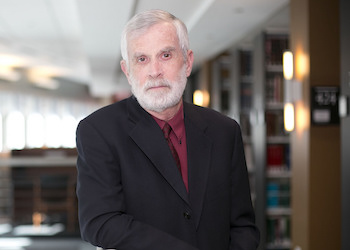Perry lectures in China, reunites with human rights scholars
By CSLR | Emory Law | Jul 26, 2017 2:07:00 PM

Michael Perry, Robert W. Woodruff Professor of Law and CSLR Fellow, lectured in China this summer, following the translation into Chinese and publication in China of two of his books: Human Rights in the Constitutional Law of the United States (Cambridge University Press, 2013) and Constitutional Rights, Moral Controversy, and the Supreme Court (Cambridge University Press, 2009).
He gave four lectures, and he had three opportunities to discuss his new book, A Global Political Morality: Human Rights, Democracy, and Constitutionalism (Cambridge University Press, 2017).
“It’s an interesting time in China,” says Perry, a scholar of constitutional law and human rights. “The Communist Party for the last four to five years has been discouraging discussion about Western values, yet constitutional law scholars in China are very interested in these issues.”
Perry discussed the way constitutional law works in the United States, but his goal was not to criticize China. “As a liberal democracy, here you can say anything, and we don’t have to worry about what we write,” he said. “For constitutional scholars in China, it can be a high-wire act.”
Some of the scholars he works with plan to practice human rights law in China, and others plan to work for the Chinese government, in hopes of changing the system from within.
Perry’s connection with China began nine years ago, when he had the opportunity to host young Chinese law professors and doctoral students as visiting scholars. He has hosted one or two visiting scholars per year since 2008. They audit his courses in constitutional rights and human rights while working on scholarly projects. In 2013, he visited China, lecturing and reconnecting with scholars who had visited Emory.
Four years later, the scholars invited Perry to return. Sixteen flew in from all over China for a conference at Zhongnan University of Economics and Law in Wuhan. After discussing his latest work with constitutional law professors, he lectured on “The Morality of Human Rights, Judicial Review, and the Supreme Court of the United States.” He gave the same lecture at another university in Wuhan, where he also discussed his current book with members of the law faculty.
Earlier in the trip, he gave two lectures in Changsha, “The Morality of Human Rights, Judicial Review, and the Supreme Court of the United States,” and “Constitutionality and Anti-Poverty Rights.”
China is relevant to Perry’s work because it is “unique among major countries in not providing for independent judicial review to investigate fundamental rights claims against the government.”
That distinction is also significant to constitutional scholars from China. “As a scholar of human rights and constitutional law,” he says, “it’s very gratifying to have the opportunity to interact with them.”
He gave four lectures, and he had three opportunities to discuss his new book, A Global Political Morality: Human Rights, Democracy, and Constitutionalism (Cambridge University Press, 2017).
“It’s an interesting time in China,” says Perry, a scholar of constitutional law and human rights. “The Communist Party for the last four to five years has been discouraging discussion about Western values, yet constitutional law scholars in China are very interested in these issues.”
Perry discussed the way constitutional law works in the United States, but his goal was not to criticize China. “As a liberal democracy, here you can say anything, and we don’t have to worry about what we write,” he said. “For constitutional scholars in China, it can be a high-wire act.”
Some of the scholars he works with plan to practice human rights law in China, and others plan to work for the Chinese government, in hopes of changing the system from within.
Perry’s connection with China began nine years ago, when he had the opportunity to host young Chinese law professors and doctoral students as visiting scholars. He has hosted one or two visiting scholars per year since 2008. They audit his courses in constitutional rights and human rights while working on scholarly projects. In 2013, he visited China, lecturing and reconnecting with scholars who had visited Emory.
Four years later, the scholars invited Perry to return. Sixteen flew in from all over China for a conference at Zhongnan University of Economics and Law in Wuhan. After discussing his latest work with constitutional law professors, he lectured on “The Morality of Human Rights, Judicial Review, and the Supreme Court of the United States.” He gave the same lecture at another university in Wuhan, where he also discussed his current book with members of the law faculty.
Earlier in the trip, he gave two lectures in Changsha, “The Morality of Human Rights, Judicial Review, and the Supreme Court of the United States,” and “Constitutionality and Anti-Poverty Rights.”
China is relevant to Perry’s work because it is “unique among major countries in not providing for independent judicial review to investigate fundamental rights claims against the government.”
That distinction is also significant to constitutional scholars from China. “As a scholar of human rights and constitutional law,” he says, “it’s very gratifying to have the opportunity to interact with them.”

